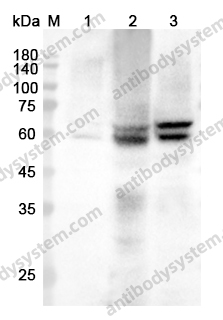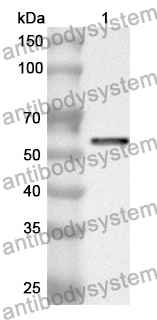Catalog No.
PHB76001
Species reactivity
Human, Mouse, Rat
Host species
Rabbit
Isotype
IgG
Clonality
Polyclonal
Immunogen
E. coli - derived recombinant Human AIFM1/AIF (Leu102-Asp613).
Tested applications
ELISA: 1:4000-1:8000, IHC: 1:50-1:100, WB: 1:1000-1:4000
Target
AIFM1,AIF,Programmed cell death protein 8,PDCD8,Apoptosis-inducing factor 1,mitochondrial
Purification
Purified by antigen affinity column.
Accession
O95831
Applications
ELISA, IHC, WB
Form
Liquid
Storage buffer
0.01M PBS, pH 7.4, 50% Glycerol, 0.05% Proclin 300.
Stability and Storage
Use a manual defrost freezer and avoid repeated freeze thaw cycles. Store at 2 to 8°C for frequent use. Store at -20 to -80°C for twelve months from the date of receipt.
Newly synthesized AIFM1 determines the hypersensitivity of T lymphocytes to STING activation-induced cell apoptosis., PMID:37000625
Anti-neuronal antibodies against brainstem antigens are associated with COVID-19., PMID:35963198
CRKL, AIFM3, AIF, BCL2, and UBASH3A during Human Kidney Development., PMID:34502088
Phosphorylation-Dependent Interactome of Ryanodine Receptor Type 2 in the Heart., PMID:34200203
CREG1 promotes lysosomal biogenesis and function., PMID:33966596
Concurrent mutations associated with trastuzumab-resistance revealed by single cell sequencing., PMID:33905021
Live-cell imaging to measure BAX recruitment kinetics to mitochondria during apoptosis., PMID:28880942
Retinal Inhibition of CCR3 Induces Retinal Cell Death in a Murine Model of Choroidal Neovascularization., PMID:27309355
CD40 ligand induces RIP1-dependent, necroptosis-like cell death in low-grade serous but not serous borderline ovarian tumor cells., PMID:26313915
[Protective action of glutamate antibodies on increased expression of genes of programmed death of rat brain cells induced by injection of a β-amyloid fragment (25-35)]., PMID:25735164
Major differences between tumor and normal human cell fates after exposure to chemotherapeutic monofunctional alkylator., PMID:24019948
The neurotoxicity of hallucinogenic amphetamines in primary cultures of hippocampal neurons., PMID:22983118
Apoptosis-inducing factor regulates skeletal muscle progenitor cell number and muscle phenotype., PMID:22076146
The radiolabeling of proteins by the [18F]AlF method., PMID:21890371
The synthesized novel fluorinated compound (LJJ-10) induces death receptor- and mitochondria-dependent apoptotic cell death in the human osteogenic sarcoma U-2 OS cells., PMID:21514013
Proteomic analysis of childhood de novo acute myeloid leukemia and myelodysplastic syndrome/AML: correlation to molecular and cytogenetic analyses., PMID:20711619
Sirt1 involvement in rd10 mouse retinal degeneration., PMID:19407027
alpha-Skeletal muscle actin nemaline myopathy mutants cause cell death in cultured muscle cells., PMID:19393268
Ascorbate (vitamin C) induces cell death through the apoptosis-inducing factor in human breast cancer cells., PMID:17786340
[Cloning and expression of recombinant mitochondrial Delta1-120 apoptosis-inducing factor and its enhancive effect on apoptosis of hepatocellular carcinoma cell line SMMC-7721]., PMID:17672939
CD44 ligation induces caspase-independent cell death via a novel calpain/AIF pathway in human erythroleukemia cells., PMID:16636662
Apoptosis-inducing factor of a cytotoxic T cell line: involvement of a secretory phospholipase A2., PMID:16609916
Metalloporphyrin-based superoxide dismutase mimic attenuates the nuclear translocation of apoptosis-inducing factor and the subsequent DNA fragmentation after permanent focal cerebral ischemia in mice., PMID:16269636
Selective proapoptotic activity of a secreted recombinant antibody/AIF fusion protein in carcinomas overexpressing HER2., PMID:16267568
Early nuclear translocation of endonuclease G and subsequent DNA fragmentation after transient focal cerebral ischemia in mice., PMID:15979239
Oligomeric Bax is a component of the putative cytochrome c release channel MAC, mitochondrial apoptosis-induced channel., PMID:15772159
Molecular cloning and characterization of a human AIF-like gene with ability to induce apoptosis., PMID:15764604
Beta-carbolines induce apoptosis in cultured cerebellar granule neurons via the mitochondrial pathway., PMID:15617732
Apoptosis-inducing factor substitutes for caspase executioners in NMDA-triggered excitotoxic neuronal death., PMID:15574746
Caspase-independent component of retinal ganglion cell death, in vitro., PMID:15505055
Survival of retinal pigment epithelium after exposure to prolonged oxidative injury: a detailed gene expression and cellular analysis., PMID:15452088
Anti-apoptotic mechanism and reduced expression of phospholipase D in spontaneous and Fas-stimulated apoptosis of human neutrophils., PMID:15368292
Apoptosis-inducing factor determines the chemoresistance of non-small-cell lung carcinomas., PMID:15286713
Cross-linking of P-selectin glycoprotein ligand-1 induces death of activated T cells., PMID:15198951
Mitochondrial permeability transition induced by reactive oxygen species is independent of cholesterol-regulated membrane fluidity., PMID:14987999
Activated protein C prevents neuronal apoptosis via protease activated receptors 1 and 3., PMID:14980205
Mediating of caspase-independent apoptosis by cadmium through the mitochondria-ROS pathway in MRC-5 fibroblasts., PMID:14743397
TCR-independent and caspase-independent apoptosis of murine thymocytes by CD24 cross-linking., PMID:14707049
Mitochondrial dysfunction in CD47-mediated caspase-independent cell death: ROS production in the absence of cytochrome c and AIF release., PMID:14585540
Apoptosis induction by interleukin-2-activated cytotoxic lymphocytes in a squamous cell carcinoma cell line and Daudi cells - involvement of reactive oxygen species-dependent cytochrome c and reactive oxygen species-independent apoptosis-inducing factors., PMID:14511235
Mitochondria control of cell death induced by anti-HLA-DR antibodies., PMID:12835725
Clearance of apoptotic photoreceptors: elimination of apoptotic debris into the subretinal space and macrophage-mediated phagocytosis via phosphatidylserine receptor and integrin alphavbeta3., PMID:12759244
Human colon cancer cells differ in their sensitivity to curcumin-induced apoptosis and heat shock protects them by inhibiting the release of apoptosis-inducing factor and caspases., PMID:12633846
Apoptosis-inducing protein derived from hepatocyte selectively induces apoptosis in lymphocytes., PMID:12519310
Role of caspases and apoptosis-inducing factor (AIF) in cladribine-induced apoptosis of B cell chronic lymphocytic leukemia., PMID:12357364
Apoptosis-inducing factor is involved in the regulation of caspase-independent neuronal cell death., PMID:12147675
Mediation of poly(ADP-ribose) polymerase-1-dependent cell death by apoptosis-inducing factor., PMID:12114629
Apoptosis-inducing factor (AIF): a novel caspase-independent death effector released from mitochondria., PMID:12022952
Productive HIV-1 infection of primary CD4+ T cells induces mitochondrial membrane permeabilization leading to a caspase-independent cell death., PMID:11689551
On the evolutionary conservation of the cell death pathway: mitochondrial release of an apoptosis-inducing factor during Dictyostelium discoideum cell death., PMID:11598188


